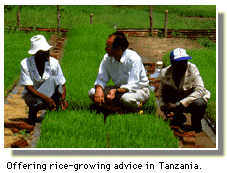 |
What sort of projects are the Japan Overseas Cooperation Volunteers doing? |
 |
The Japan Overseas Cooperation Volunteers, or JOCV, program is part of Japan's overall program of "official development assistance," that is, aid to other countries. The JOCV program takes advantage of the skills and knowledge of young Japanese who want to help out with development and training in other countries.
The jobs that these volunteers have been doing cover a wide range. Some of them have helped to keep the desert from spreading in areas around the Sahara by teaching local people techniques for making trees grow. Others have helped protect orangutans living in the jungle. Some volunteers are nurses and midwives who have worked to improve conditions for mothers and babies in places where hygiene isn't good. And some of them are coaches who have gone to little towns on islands in the Pacific and in Latin America to teach kids how to enjoy sports more and play better. The people in the countries where these volunteers have been working appreciate their help very much.
The volunteers get a lot out of the JOCV program too. They have the satisfaction of helping out people in many other countries, and they also have a chance to broaden their own view of life and the world by learning about the customs and thinking of other people. This program has done a lot to promote understanding and friendship between Japan and the developing countries.
Photos courtesy of JICA. |
 | |
 The Japanese government set up the JOCV program in 1965, and since then more than 18,000 volunteers have gone to a total of 67 countries in Asia, Africa, the Middle East, Oceania, Latin America, and Eastern Europe. There are over 2,140 volunteers currently serving overseas, and they are doing work in about 160 different occupational categories. The usual term of service is two years; during this period, the volunteers live and work together with local people, speaking with them in their own language and making friends with them. The work they do is designed to help the local people do more for themselves.
The Japanese government set up the JOCV program in 1965, and since then more than 18,000 volunteers have gone to a total of 67 countries in Asia, Africa, the Middle East, Oceania, Latin America, and Eastern Europe. There are over 2,140 volunteers currently serving overseas, and they are doing work in about 160 different occupational categories. The usual term of service is two years; during this period, the volunteers live and work together with local people, speaking with them in their own language and making friends with them. The work they do is designed to help the local people do more for themselves. To give a more specific example, JOCV volunteers in Tanzania taught local people how to grow a type of rice that lets them harvest three crops a year. This made it possible for the farmers to grow more, and it also meant more income for rice traders and field workers, including even the people who are hired to keep birds away from the crops.
To give a more specific example, JOCV volunteers in Tanzania taught local people how to grow a type of rice that lets them harvest three crops a year. This made it possible for the farmers to grow more, and it also meant more income for rice traders and field workers, including even the people who are hired to keep birds away from the crops.